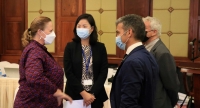News

01/02/2023
Sprouts represent a unique food safety challenge because of the warm, moist and nutrient-rich growing environment, which is also ideal for foodborne pathogens to thrive and multiply. Therefore, it is especially important that the seeds used for sprouting are free from pathogens and to prevent the introduction of any contaminants anywhere during the sprouting-to-consumption continuum.
The Joint FAO/WHO Expert Meetings on Microbiological Risk Assessment (JEMRA) recently published a technical report on the prevention and control of microbiological hazards in sprouts. Experts reviewed publicly available literature, guidelines from competent authorities and industry associations to assess the current state of knowledge on controlling...

31/01/2023
The Joint FAO/WHO Expert Meetings on Microbiological Risk Assessment (JEMRA) is pleased to announce its line-up for the 2023-2027 period. A total of 93 international scientific experts from 33 different countries, representing all FAO regions, were selected in response to the call for experts issued in 2022. Members of the roster will be considered for future activities of JEMRA (meeting...

27/01/2023
This week FAO began a project to improve the food control system in the Kingdom of Eswatini. A 5-million-euro project funded by the European Union, "Strengthening of Capacities and Governance in Food and Phytosanitary Control,” which began just two months ago, is set to provide technical support and work with Competent Authorities and other leading institutions in 12 Common Market for Eastern and Southern Africa (COMESA) Member Countries to build up capabilities, strengthen governance and improve strategic planning around two main components: food safety and plant health.
As part of the food safety component, an assessment of the national food control...

10/01/2023
Over the past few years, Serbia, with the support of FAO and the European Bank for Reconstruction and Development (EBRD), has been developing a set of food hygiene measures, customized for small, family businesses in particular. The underlying aim is that the diverse array of high-quality food products continue to preserve cultural heritage and generate smallholder livelihoods while also meeting food safety and quality standards.
Read more here
Read more about the FAO Investment Centre

06/01/2023
Bolivia, Cambodia, Colombia, Mongolia, Nepal and Pakistan have now assessed their plans to address foodborne antimicrobial resistance (AMR) as part of the “Action to support implementation of Codex AMR Texts (ACT)" project.
“The main goal was to assess how each country is doing regarding the implementation of the Codex AMR texts,“ said Jorge Pinto Ferreira, FAO Food Safety Officer, referring to: Guidelines for Risk Analysis of Foodborne Antimicrobial Resistance, Guidelines on Integrated Monitoring and Surveillance of Foodborne Antimicrobial Resistance, and Code of Practice to Minimize and Control Foodborne Antimicrobial Resistance.
“It was important to identify the gaps and prepare the action...

05/01/2023
Together with Wageningen University, FAO held a workshop on 16 December 2022 about early warning tools and systems that can be used to manage imminent and emerging food safety issues. In attendance were food safety competent authorities, research and academia from 31 countries. The two virtual sessions were an opportunity to present a draft technical report that outlines various early warning tools and systems in food safety; gather feedback on the feasibility to apply the solutions proposed in the paper, such as Artificial Intelligence (AI) and Big Data in low- and medium-income countries; and identify matters of operational or strategic...

21/12/2022
With the objective to determine the amount of food allergens that can represent a risk to allergic individuals, the joint ad hoc FAO/WHO Expert Consultation on Risk Assessment of Food Allergens convened the second in a series of meetings on food allergens addressing “How much is too much?”
While some allergic individuals don’t react to low doses of food allergens, others experience tingling or itching sensations and few may even have severe reactions. A worrying one is the rare, but potentially life-threatening anaphylaxis. As part of an ad hoc Joint FAO/WHO Expert Consultation on Risk Assessment of Food Allergens, experts with...

13/12/2022
A recent article written by Keya Mukherjee, FAO Food Safety Specialist, and Vittorio Fattori, FAO Food Safety Officer, made it to the cover of the December 2022/ January 2023 issue of the Food Safety Magazine. The article was based on a publication released earlier in 2022, Thinking about the future of food safety – A foresight report.
The article described the importance of using foresight approaches in global food safety given the myriad challenges that the agrifood systems face today and will continue to in the near future. The areas covered by the article include climate change, new foods...

02/12/2022
This week FAO began a project to improve the food control system in the Seychelles. A 5-million-euro project funded by the European Union, "Strengthening of Capacities and Governance in Food and Phytosanitary Control”, will provide technical support and work with Competent Authorities and other leading institutions in 12 Common Market for Eastern and Southern Africa (COMESA) Member Countries to build up capabilities, strengthen governance and improve strategic planning around two main components: food safety and plant health. As part of the food safety component, an assessment of the national food control system will be carried out in the Seychelles, which...

29/11/2022
FAO has initiated country-level activities, as part of a global 5-million-euro project to improve food safety and phytosanitary control throughout 12 African countries in the Common Market for Eastern and Southern Africa (COMESA) region with training sessions for key participants in the island nation of Comoros.
"Strengthening of Capacities and Governance in Food and Phytosanitary Control,” a two-year project funded by the European Union, is spearheaded by a team of food safety experts from FAO’s Food Systems and Food Safety Division. The team will provide technical support and work with governments to build capacity, strengthen governance and improve the strategic planning...
Stay up to date and connect to our RSS feed!
